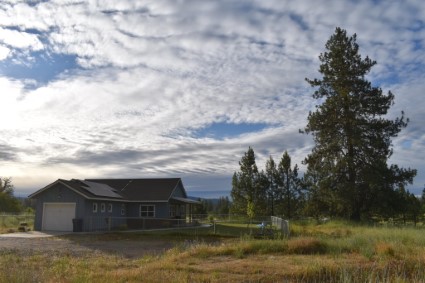As Development Manager of the Spokane Indian Housing Authority, Clyde Abrahamson never thought his job would involve solar energy. But after the Cayuse Mountain Fire in 2016 destroyed 14 homes and tens of thousands of acres of Tribal land, the Spokane Tribe decided to invest in energy sovereignty and climate resilience - with solar power.
Through the Spokane Tribe’s Children of the Sun Solar Initiative (COSSI), eight community buildings, 23 tribal homes, and a fish hatchery are now powered by the sun. GRID Alternatives’ Tribal Program partnered with the Spokane Indian Housing Authority to install the systems - totalling 650 kilowatts of solar energy - which will result in 2.8 million dollars in savings over the next 35 years, funded by the Tribal Solar Accelerator Fund.
 Rebuilding from Broken Promises
Rebuilding from Broken Promises
When the Grand Coulee Dam was built, the Spokane Tribe was promised compensation for displaced land and disturbed resources. But like so many Native American Indian Tribes, the Spokane Tribe only experienced broken promises. The Grand Coulee dam built for electricity resulted in the forceful removal of the Spokane Tribe from their native lands along the Columbia River system and depleted the Tribe’s subsistence fishing supply. “We became disconnected to that resource the river provided us,” explains Tim Peone, Manager of the Spokane Tribal Hatchery.
The Spokane Fish Hatchery, run by Tribal members, raises local species of fish to repopulate the waters while providing sport and subsistence fishing for the Tribe. “The hatchery helps to reconnect us to the lost part of our culture - fishing.” says Tim. And now, 100 kilowatts of solar energy is powering the hatchery. “It’s a pathway to reconnect us to the river,” notes Tim.
 Safety + Education + Impact = Energy Sovereignty.
Safety + Education + Impact = Energy Sovereignty.
Many of the Spokane families’ lives are already being transformed from the solar on their home. One family of five used to have bills ranging from $100 to $350 each month, accounting for as much of 40% of their income. At the end of the month, they would have to get assistance from their family members in buying groceries. With solar, the energy bills have decreased and the family can afford their bills and groceries throughout the entire month. “Reducing families’ energy burden is one way we can help,” Clyde explains.
Spokane Tribal members worked side by side with GRID staff for four months, learning the solar installation process from start to finish on a variety of roofs. “A huge component was safety,” says Clyde, witnessing the daily morning and evening safety meetings. Tim adds, “The education gave them the opportunity to learn a new skill.” Now The Spokane Tribe is equipped to handle maintenance of the systems, and is prepared for future installations.
Achieving Energy Sovereignty
“We are hoping this project is just a stepping stone to more solar,” says Tim. Solar energy means energy savings, local jobs, and resilience in the face of the climate crisis. With the power of the sun, the Spokane Tribe is reconnecting and rebuilding their natural environment and culture that was taken from them, and working towards energy sovereignty. Hopefully, Clyde’s job will involve solar energy for a long time to come.
